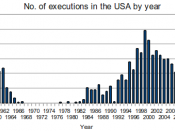Capital punishment (also commonly known as the death penalty) has continuously endured many changes throughout American history. Although it has always been questionable, the United States should continue to use capital punishment. Supporters of the death penalty have numerous arguments to defend their position. Many believe capital punishment allows victimÃÂs families retribution when a loved one is killed. Money is saved in the states that participate in the death penalty. Capital punishment deters others from committing like punishable crimes.
The most commonly known crime punishable by death is murder. This is why many supporters of capital punishment believe in retribution against the criminal for the crime committed. This offers sympathy toward families of murder toward families of murder victims. Many people believe that:Retributive justice means that the criminal must be made to pay for the crime by a crude mathematics that demands the scales of justice be balanced; this appeals to humanityÃÂs basest animal instincts and ancient demands for an eye for an eye, a life for a life.
(Grant, Jan/Feb 2004, p. 26)Many advocators against the death penalty will claim the entire process to execute a capital murderer cost more than it would cost for life in prison. Kozinski and Gallagher (Fall 95) stated ÃÂÃÂ it is exceedingly difficult to compare the cost of a death penalty case with that of a non-capital murder case because the typical course of litigation diverges so widelyÃÂ (para. 16). The argument with this is that states could save money by reducing the growing prison populations.
Supporters of capital punishment believe it deters crime and therefore saves lives. Schonebaum (2002/August 2004) states ÃÂThe theory of deterrence is based on the idea that the threat of punishment must be severe enough to counter the benefits or pleasures that the criminal would receive from the crimeÃÂ...



Capital
How would I summarize this essay in a single sentence?
"A lot of people have strong emotional reasons for why they want to keep capital punishment, so we ought to keep it."
Note that this summary, which I consider accurate, says little about the soundness of the reasons, or the soundness of the underlying need, or anything about whether capital punishment is "right" or "wrong." Reduced to its basic point, this essay seems more concerned about the popularity of capital punishment than about the substantive arguments about capital punishment.
0 out of 0 people found this comment useful.